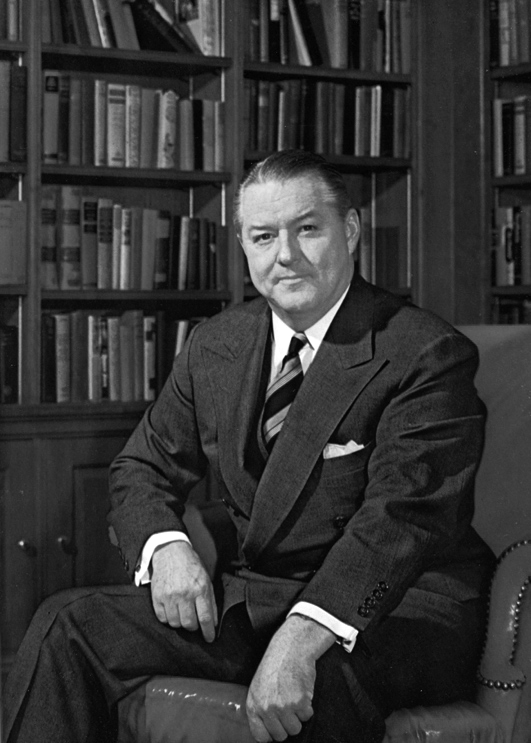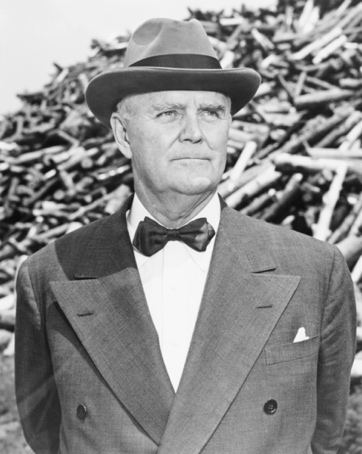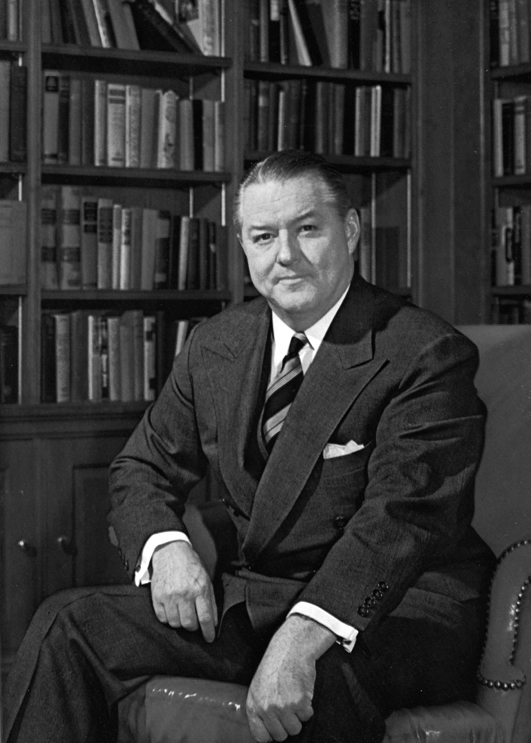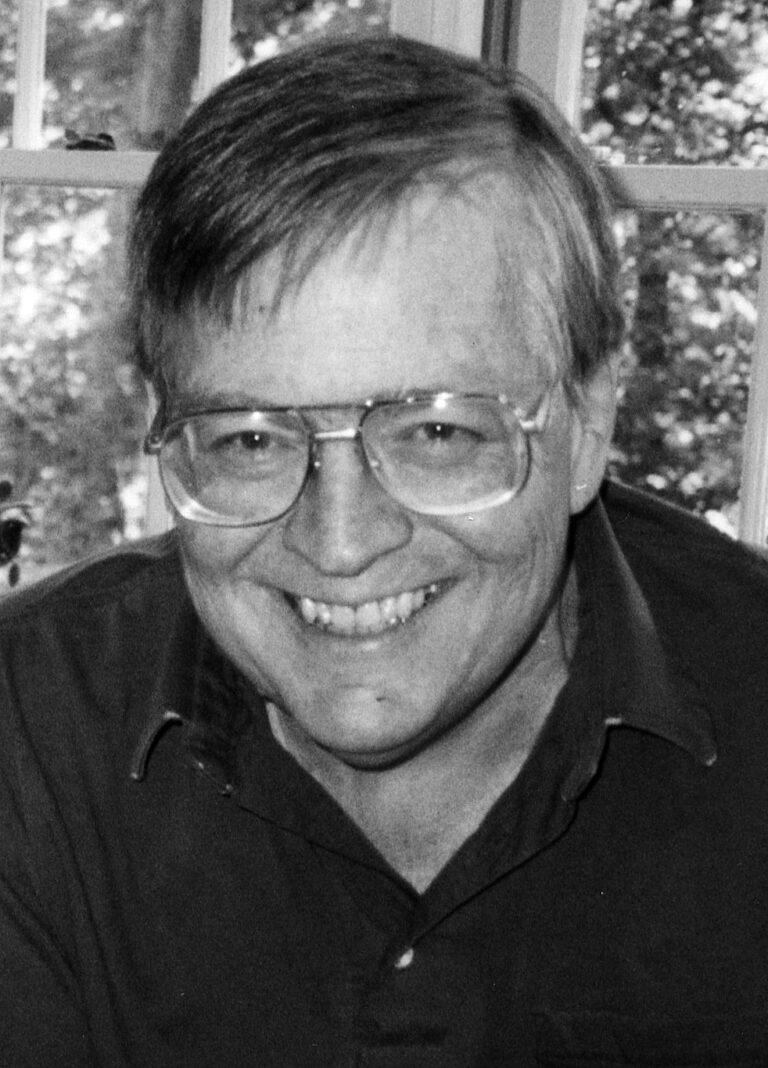
Reuben Buck Robertson, Jr. (1908-1960)
By Reuben Buck Robertson, III
from “Our Robertsons”
Copyright © 2023 Victoria Robertson
Reuben Buck Robertson Jr., oldest son of Hope Thomson and Reuben B. Robertson Sr., was born on June 27, 1908, in Asheville, North Carolina. He became a leading industrial manager in the paper industry and a top-level government executive before his accidental death in 1960.
Reuben attended Yale University, obtaining a B.S. degree in chemical engineering in 1930 from Yale’s Sheffield Scientific School. Although he struggled at times on the academic front, Reuben was a star soccer player in college, serving as captain of the Yale team and named to the All-American team. He also played on the varsity baseball team, was a member of St. Anthony Hall, and was elected to the Aurelian Honor Society.
As a young man, Reuben’s driving ambition was to follow his father’s large footsteps and go into the business founded by his grandfather Peter G. Thomson, which by this time was combined into a single firm known as the Champion Paper and Fibre Company. Following college, Reuben seized an opportunity to spend four months in Germany and other parts of Europe studying forestry under the tutelage of Dr. Karl A. Schenck. In the fall of 1930, he went to work as a mill hand in the wood yard of Champion in Canton, North Carolina. With an intense determination to master the processes of pulp and paper making, he worked successively in almost all of the departments of the Canton mill. An enthusiastic, energetic, and thoroughly charming person, the handsome “Young Reuben” became a well-known and popular figure at Champion. In 1934, he was promoted to assistant to the general manager of the mill in Canton; the following year he was made vice president in the Carolina Division; and in the late 1930s, he was transferred to the Ohio Division to implement new cost-control systems and work on organizational and personnel matters.
Shortly after his move to Ohio, Reuben Jr. and Margaret Louisa Watkins (called “Peggy”) were married on December 17, 1938, in Charleston, South Carolina. Born on November 15, 1915, in Birmingham, Jefferson County, Alabama, Peggy was the daughter of Margaret Horry Chisolm and George L. Watkins. Because of her mother’s early death, when Peggy was not yet four years old, she was raised by her aunt and uncle Louisa S. Chisolm and Daniel E. Huger in Charleston, South Carolina. Peggy was an aspiring actress who had performed with the Barter Theater in Abingdon, Virginia, to excellent reviews and was launching a career on Broadway, but she agreed to give up the stage to start a family with Reuben.
Peggy and Reuben Robertson Jr. first set up housekeeping in a tiny frame house in the village of Glendale, a suburb of Cincinnati, Ohio. Soon he was appointed vice president and general production manager of Champion at its headquarters in Hamilton, Ohio, and he and Peggy acquired a farm near Mount Healthy, roughly halfway between Hamilton and Cincinnati, on which they started constructing a large brick home. The Second World War interrupted these plans, however, and in August of 1942, Reuben was called to Washington, D.C., to serve on the War Production Board. After a few months in that role, he transferred to active duty in the US Army. He was commissioned a captain in 1943, a major the following year, and lieutenant colonel in 1945. Reuben was discharged from the Army on October 10, 1945, (the birthdate of his third son) and returned to Ohio to resume his career with Champion.
After the war, Peggy and Reuben completed construction of their home on the estate they called “Millbrook Farm,” where they raised six children and many animals.
Reuben Robertson Jr. was a dynamic and charismatic business leader. He became the Executive Vice President of Champion in 1946, and in 1950, he succeeded his father as president of the company and joined its board of directors.
Throughout his life, Reuben had a strong interest in government and public service. In 1950, President Truman appointed him as a member of the Wage Stabilization Board, on which he served until June 1951. He was appointed to the Business Advisory Council of the US Secretary of Commerce and became vice chairman of that board in 1953. At the request of President Dwight D. Eisenhower, Reuben led a team of business executives who evaluated the US Mutual Security Program in Germany, and as a result of that work, he was honored as “Man of the Year” by the National Association of Manufacturers in 1953. He was featured by Business Week magazine in the cover story for its August 1, 1953, issue.
In 1955, Reuben was named vice chairman of the Committee on Business Organization in the Department of Defense (a special task force of the Hoover Commission). He was asked to consider an appointment as Undersecretary of State but declined that opportunity because of his management obligations at Champion.
Later in 1955, President Eisenhower appointed Reuben Robertson Jr. as Deputy Secretary of Defense of the United States, and the family moved to Washington, D.C., for two years. In that position he was officially second in command in the Defense Department, in which are placed the US Army, Navy, and Air Force, and during the frequent absences of Charles Wilson, the Secretary of Defense, Reuben held the position of Acting Secretary. When Secretary Wilson resigned in 1957, Reuben was invited to succeed him but decided that his family and business responsibilities had to take priority. He turned down the opportunity to move into the secretary’s office and instead persuaded President Eisenhower to appoint his friend and fellow Cincinnatian, Neil H. McElroy of the Procter and Gamble Co.
Resigning from the Defense Department in 1957, Reuben returned to his previous position as President of Champion Papers in Hamilton, Ohio. He held many business and civic positions in addition to his career in Champion and in government. He was a director of major industrial and financial corporations, including Procter and Gamble, the B.F. Goodrich Co., Cincinnati and Suburban Bell Telephone Co., and Wachovia Bank and Trust Co. He served as a Trustee of Miami University in Oxford, Ohio, and of Duke University in North Carolina, and as a director of the Ohio Foundation of Independent Colleges.
On March 13, 1960, at the age of fifty-one, Reuben was struck and killed by a speeding car late at night when he stopped to investigate an automobile accident on Paddock Road in Cincinnati. His death was front-page news throughout the United States. A memorial tribute delivered by the Ohio Chamber of Commerce, of which he had been a director for several years, cited Reuben Robertson Jr. as “a man of selfless integrity, vision and tireless energy” who had made great contributions “to the Nation, the State, to his community and to industry.” He was buried near his father in Spring Grove Cemetery, Cincinnati.
Reuben’s widow, Peggy, later married Leslie A. Meek, a distinguished attorney in Cincinnati. She died on November 27, 1990, in Cincinnati at the age of seventy-five and was buried in Spring Grove Cemetery.


